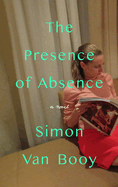
A novel about terminal illness could be depressing, unless the author has a gift for finding the poetic in the terrifying, as Simon Van Booy (The Sadness of Beautiful Things; Father's Day) does in The Presence of Absence. Van Booy claims in a prologue that he received a letter from Hadley Little, the widow of an author he admires. Max Little "had left a small journal of his last days." Hadley asks Van Booy to incorporate "the fragments of her husband's final thoughts into a novel." This frequently heartbreaking work is the result. The first part consists of short chapters the dying Max wrote from his "square hospital room," revisiting moments from his life "as permitted by the drunk librarian of memory." Among them are his life with Hadley, his struggle to figure out how to tell her about his diagnosis and his friendship with Jeremy, fellow patient of an end-of-life therapist. The second part shifts to a young New Jersey girl whose connection to the story is slowly revealed.
With its elegant passages on love and the fallibility of memory, The Presence of Absence may remind some readers of the novels of Alain de Botton. But this indelible portrait of transience, sorrow and hope will move readers even if they don't make that connection. "Grief is a frantic, inconsolable child," Max writes. Van Booy's novel is like a comforting arm hesitantly placed across a bereaved friend's shoulders--unlikely to soothe, but sincere in its attempt. --Michael Magras, freelance book reviewer

